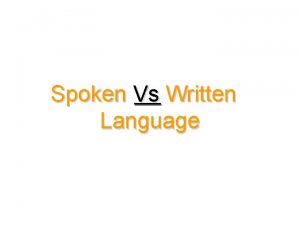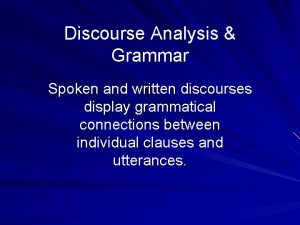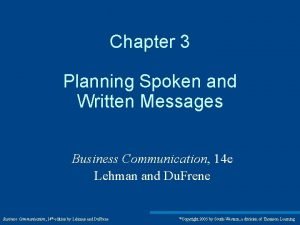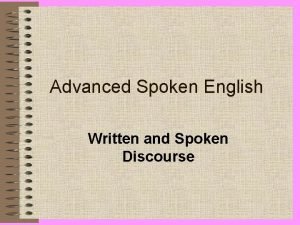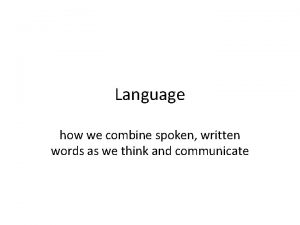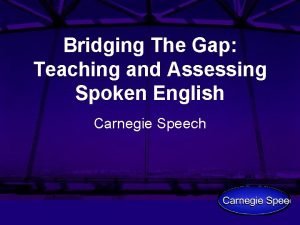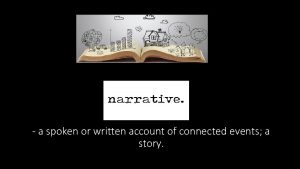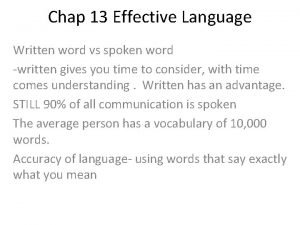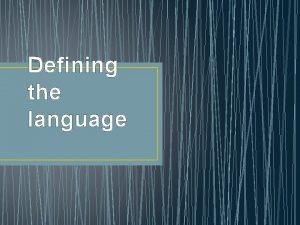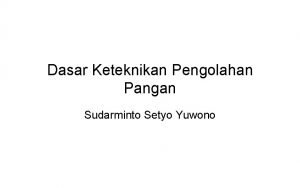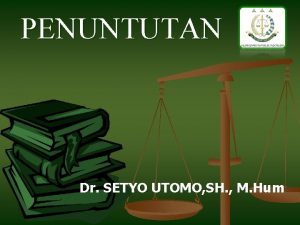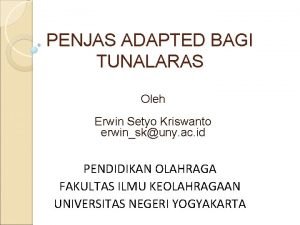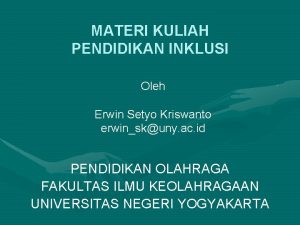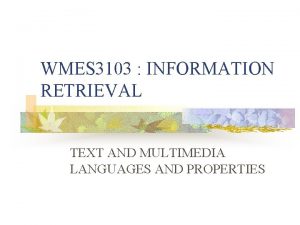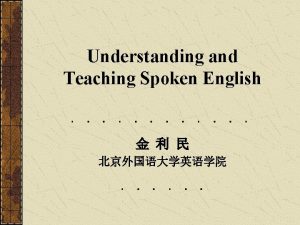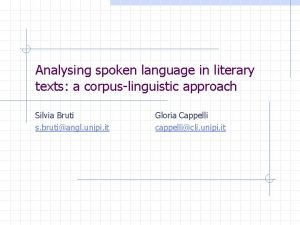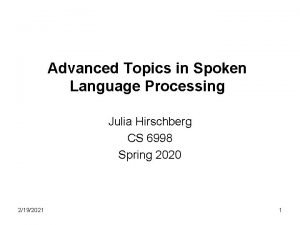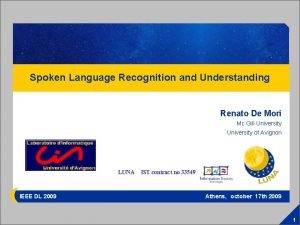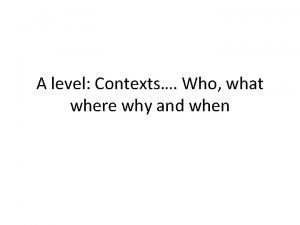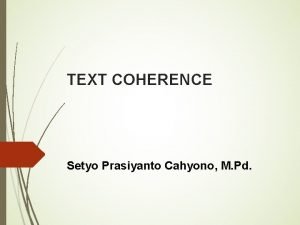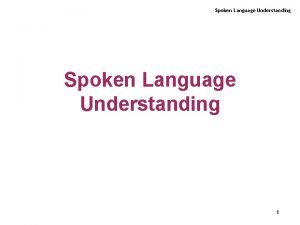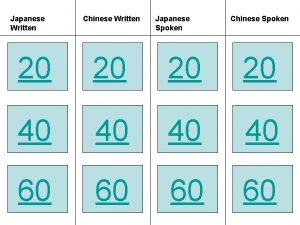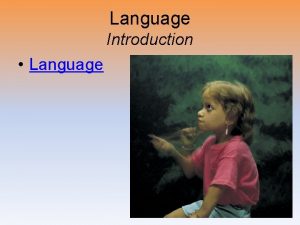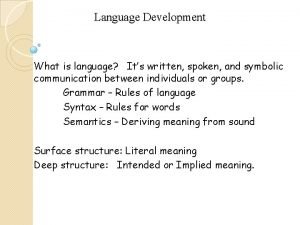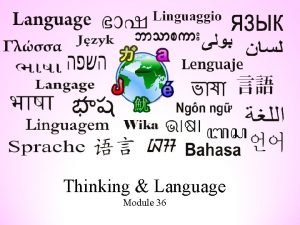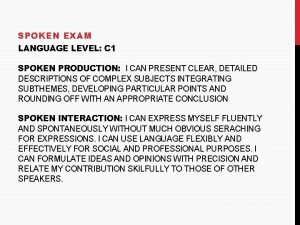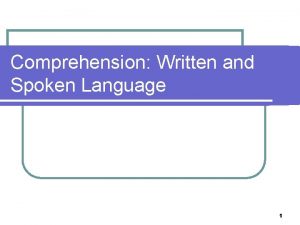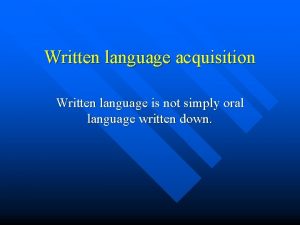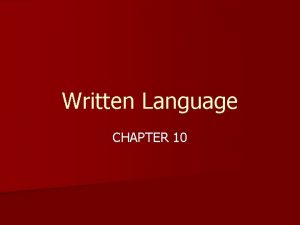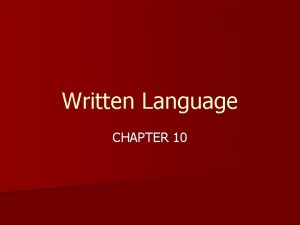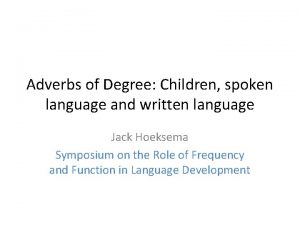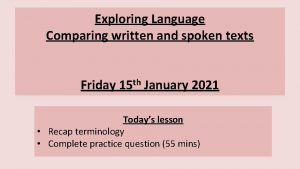Spoken and Written Language Setyo Prasiyanto Cahyono S
























- Slides: 24

Spoken and Written Language Setyo Prasiyanto Cahyono, S. S, M. Pd.

Spoken and Written Language • Written language is not simply speech written down. • They are different because they evolve to serve different functions. • Early writing tended to be oriented towards goods and services: law, codes of behaviour, transaction. • Artistic functions originated in the spoken language, and were only later written down • Spoken language is more context dependent; written language tends to be more independent of its immediate context.

SPOKEN AND WRITTEN LANGUAGE CONTINUUM Most Spoken Language accompanying action Most Written Language as reflection Spoken Language Written Language

The Continuum • • Most Spoken Context dependent Language as action Language as process (dynamic) • Most Written • Context independent • Language as reflection • Language as product (synoptic)

Different Features • Turn taking organisation • Context dependent • Dynamic structure Ø Interactive staging Ø Open ended • Spontaneity phenomena (false start, hesitation etc. ) • Monologic organization • Context independent • Synoptic structure Ø Rhetorical staging Ø Closed / Finite • Final draft/polished (indication of earlier draft removed)

Different Features • Everyday lexis • Non-standard grammar • Grammatical complexity • Lexically sparse • Prestige lexis • Standard grammar • Grammatical simplicity • Lexically dense

Context Dependent • Meanings are recovered by context • Not everything should be explicitly stated • Stating everything may result in “overexplicitness”, thus, unnatural • Language choice depends on context of situation (tenor, field, mode)

Context Independent • Meanings and context are created and presented by writers. • Everything should be presented for clarity. • Completeness is necessary. • Language choice is based on the imagined readers

Dynamic Structure • • • Structures are repeated Interactive staging Open-ended A lot of opening and re-opening A lot of topics

Synoptic Structure • Generic structure potential: recount, procedure, report etc. • Rhetorical staging • Closed / finite / fixed

Spontaneity Phenomena • • Incomplete clauses Gambits False start Topic termination Overlap Interruption Etc.

Final Draft • • • Well structured Complete sentences Well punctuated Free from spelling mistakes Undergoes several editing processes Polished language

Everyday vs. prestige lexis • • Start Lively Fun Guys • • Commence Vivacious Joyful Ladies and gentlemen • Etc.

Standard vs. Non-standard grammar • There’s a lot of people. • It’s me! • I wanna go • I ain’t going • There are many people. • It is I. • I want to go • I am not going

Grammatical Complexity & Lexically sparse Hey, I tell you what! Yesterday I went to… you know this place? They call it Guci. It’s somewhere around this city… what do you call it? The city that people plant those shallots and also lots of salted duck eggs? I think it starts with B or something. From here it’s rather far… I think it’s after Tegal.

Grammatical Simplicity & Lexically Dense Yesterday I went to a little town called Guci. It is a small cool city located at a cool mountain slope not far from Brebes. Usually people come to Guci to enjoy some hot-water springs that are believed to have strong soothing effects to those who suffer from waterborn skin diseases caused by badly managed sewage sanitation.

Spoken Language • Based on clauses • Subjects/objects: simple pronouns (you, I) or noun phrase (my father, the house • Gambits: help clarify interpersonal meanings • Fillers (well…, uhm…, right…) • More emphasis on interpersonal meanings

Written Language • Based on sentence • Subjects/Objects are realised in complex noun phrases • Use of passive patterns (less personal, objectified) • More emphasis on ideational meanings

Spoken: grammatical intricacy (G&W 1995: 162 -163) I can’t mind the kids today Because I must go to fotball training And can’t leave early Because we’ve got an important game on Saturday And if we win it We go into the finals Because I don’t have training So I can mind them then

Written Form: Lexical density (p. 164) Due to the importance of a win in Saturday’s football game as a pre-requisite for a final appearance, the necessity of my training attendance diminishes my child minding capacity tonight However, the lack of an attendance requirement on Wednesday allows my availability consequent upon your approval.

What has changed? • The way the information is distributed, the number of content words per clause has risen dramatically. • The lexical density has risen. • Grammatical changes push the lexical density up. • The key difference in grammar is the amount of grammatical metaphor.

Nominalisation • Much information that was spread out in the spoken language has been condensed by way of nominatisation. e. g. • because I must go to football training (clause) • The necessity of my training requirement (noun phrase)

Example (Halliday 1989) • Spoken: This is yer phone bill and you hafta go to the post office to pay it – uh by next Monday, that’s what this bax tells ya – or they’ll cut the phone off. • Written: All phone bills must be paid by the date shown or service will be discontinued.

Thank You Have a nice day
 Language
Language Display
Display This can be spoken and written messages
This can be spoken and written messages Types of discourse
Types of discourse In a language the smallest distinctive sound unit
In a language the smallest distinctive sound unit Spoken english and broken english summary
Spoken english and broken english summary Is a spoken or written account of connected events
Is a spoken or written account of connected events A spoken or written account of connected events; a story. *
A spoken or written account of connected events; a story. * Written word vs spoken word
Written word vs spoken word Macrolinguistics definition
Macrolinguistics definition Kejaksaan republik indonesia
Kejaksaan republik indonesia Dr setyo utomo jaksa
Dr setyo utomo jaksa M-3n=16m+5n=-8
M-3n=16m+5n=-8 Adhi setyo santoso
Adhi setyo santoso Erwin setyo kriswanto
Erwin setyo kriswanto Erwin setyo kriswanto
Erwin setyo kriswanto Spoken language audio retrieval in irs
Spoken language audio retrieval in irs What language is spoken in vietnam
What language is spoken in vietnam Back chanelling
Back chanelling Spoken language features
Spoken language features Most spoken language in the world
Most spoken language in the world Most spoken language in the world
Most spoken language in the world Adv spoken language processing
Adv spoken language processing Language spoken in athens
Language spoken in athens Why was french the language spoken in valmonde
Why was french the language spoken in valmonde
